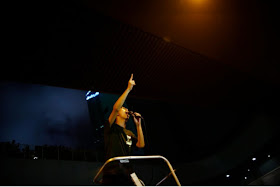[That perspective has threaded through the trials of Chinese lawyers and rights advocates convicted and sentenced on subversion charges this year. It was echoed in a meeting this month about strengthening ideological controls in Chinese universities. A law governing foreign nongovernment organizations that takes effect on Jan. 1 was also partly motivated by fears of foreign subversion.]
By Chris Buckley
BEIJING — The ominous images in the video pile up, set to darkly urgent
music. Refugees fleeing failed uprisings in the Middle East. Western diplomats
and politicians cast as puppet masters of subversion in China. Chinese lawyers
abjectly confessing to subversion in show trials. Protests erupting in Hong
Kong.
“ ‘Color revolution’ has already succeeded in pushing many
countries into the flames of war and schism, and its devilish claws are
reaching into China,” one of the subtitles in the video reads. It goes on to
say: “Embassies in China are at the forward command, combining forces to
promote ‘street politics.’ ”
The video, which spread on the internet this
week, has been widely promoted online by public security offices that oversee
the police, including an office of the central Ministry of Public Security. But
who ordered its production is unclear. An earlier version surfaced online in
August but disappeared from the internet, only to resurface in its current
version.
Attempts to contact the makers, whose working
name, Gewuzhijian, appears at the end of the video and also on Weibo, a Chinese
social media service, went unanswered.
The video is a seven-and-a-half-minute
phantasmagoria of the Communist Party’s nightmares of Western subversion. It
does not have an official title, but it has been promoted online under the
question “Who most wants to overthrow China?”
“Color revolution” is the party’s thumbnail
term for these fears, and the video, while shoddily made, offers a vivid lesson
in how threats to party control — real or imagined — that can seem unrelated to
outsiders are often seen inside the party as calculated moves in a grand plot,
orchestrated from Washington, to bring it down.
The term “color revolution” first gained
currency in China to describe antigovernment insurrections in former Soviet
bloc countries, which Chinese officials have said were coups inspired by the
United States. The party says such uprisings are a template of malign Western
plans for China.
This conspiratorial worldview is more than
bombast. It’s a longstanding theme that has gained greater official credence
under President Xi Jinping.
That perspective has threaded through the
trials of Chinese lawyers and rights advocates convicted and sentenced on
subversion charges this year. It was echoed in a meeting this month about
strengthening ideological controls in Chinese universities. A law governing
foreign nongovernment organizations that takes effect on Jan. 1 was also partly
motivated by fears of foreign subversion.
“The first option for hostile forces
infiltrating us is our education system,” the Chinese minister of education,
Chen Baosheng, said in remarks published this month. “To wreck your future,
first of all they wreck your schools.”
China has been increasingly exposed to the
world through trade, travel and the internet, and its citizens are in many ways
increasingly sophisticated. Even so, party propaganda remains deeply bound to
the view that China faces not just disparate critics and foes, but a closely
meshed conspiracy that unites those forces. The video is an especially feverish
dose of that worldview.
It says plotters and subversives are
“stirring up mass incidents and using social tensions as a point to break
through and serve as the fuse for ‘color revolution.’ ” They are, it says,
“using foreign nongovernmental organizations to nurture ‘proxies’ and to
establish a social basis for ‘color revolution.’ ”
Hong Kong, in particular, is depicted as a
bridgehead for Western subversion in China. The pro-democracy law professor
Benny Tai, the media entrepreneur Jimmy Lai, the student leader Joshua Wong and
others are lined up as among those “making Hong Kong into a base for ‘color
revolution.’ ”
The video also refers briefly to booksellers
from Hong Kong who were abducted and taken to mainland China last year,
prompting an outcry in the city, which is supposed to have substantial legal
autonomy as a self-administered Chinese territory. The video says the
booksellers, who specialized in lurid and wildly imaginative accounts of
China’s political elite, had “traduced the images” of party leaders.
Under Mr. Xi, who assumed power four years
ago, such videos have become an increasingly important part in the party’s
arsenal of propaganda. “Silent Contest,” produced by China’s National Defense
University and issued in 2014, was even more breathless in its depiction of
Western threats.
But the new video ends on a reassuring note.
The dark images and rhetoric give way to swelling melodies and images of a
bright dawn over the Great Wall. There are pictures of smiling citizens and of
muscular People’s Liberation Army troops.
“Thoroughly expelling ‘color revolution’ from
China will be a long war,” the video warns. But at the end it declares: “If
there is war, we will answer the call.”
Follow Chris Buckley on Twitter @ChuBailiang.
Adam Wu contributed research.
